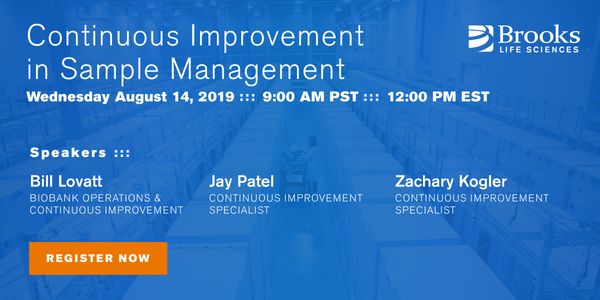Biobanking
Biobanking refers to the collection of samples of bodily fluids or tissue for use in research to improve understanding of health and disease. Information, such as height, weight and questions about things that may have a bearing on health (e.g. family history and lifestyle) may also be recorded at the same time, to provide the context for the samples. The samples are often kept indefinitely or for several years, depending on the study, so that long term future research can be carried out.
-
NGS is still perceived as a complex, hard to implement and validate method that requires highly experienced people. Outsourcing next-generation sequencing (NGS) testing could be an option to...Speaker: Prof. Dr. Michael HummelPresented at: OncomineWorld 2022: A Virtual NGS Education Meeting
NGS is still perceived as a complex, hard to implement and validate method that requires highly experienced people. Outsourcing next-generation sequencing (NGS) testing could be an option to...
Speaker:
Prof. Dr. Michael Hummel
Presented at: OncomineWorld Autumn: A virtual NGS education meeting
Molecular profiling is key in precision oncology research and whilst the tissue testing has become a routine, liquid biopsy might provide a non-invasive alternative when tissue biopsy is ina...
Speaker:
Siew-Kee (Amanda) Low, PhD
Presented at: OncomineWorld 2022: A Virtual NGS Education Meeting
The development of molecular targeted therapy is one of the breakthroughs in oncology field. Molecular profiling of the tumor becomes mandatory in the routine clinical practice to select the...
Speaker:
Siew-Kee (Amanda) Low, PhD
Presented at: OncomineWorld Autumn: A virtual NGS education meeting
APR 16, 2020 | 9:00 AM
DATE: April 16, 2020 TIME: 9:00am PT, 12:00pm ET There is an increasing need to evaluate and understand unique phenotypes and mechanisms of action within the tumor microenvironment. Existing...
APR 07, 2020 | 8:00 AM
DATE: April 7, 2020 TIME: 8:00am PT, 11:00am ET This webinar sets out to establish why quality control is key to robust, reliable, reproducible science. We will look at best practice criteri...
DEC 05, 2019 | 9:00 AM
DATE: December 5, 2019TIME: 9:00am PST, 12:00pm EST Characterization of the spatial distribution and abundance of proteins and mRNAs with morphological context within tissues e...
Speaker:
Mathias Holpert, PhD
, Traci DeGeer, BS, HT (ASCP) HTL, QIHC
Sponsored By: Leica Biosystems,
NanoString Technologies
Over the last decade, the policy and regulatory trajectory of genomic and reproductive technologies has been a checkered one. Approaches around the world range from constitutional and crimina...
OCT 02, 2019 | 11:00 AM
DATE: October 2, 2019TIME: 11:00am PDT, 2:00pm EDT Ditch the Excel spreadsheets and manage your molecular workflows entirely in your LIMS Achieve configuration of molecular workf...
AUG 14, 2019 | 9:00 AM
DATE: August 14, 2019TIME: 9:00am PT. 12:00pm ET Implementation of Lean Methodology in Biobanking Operations to standardize sample management processes is effective. Each proce...
JUL 30, 2019 | 6:00 AM
DATE: July 30, 2019TIME: 6:00am PT, 9:00am ET The current version of the EMA Guideline for the environmental risk assessment of human drugs was published in 2006. This guidance...
JUN 26, 2019 | 9:00 AM
DATE: June 26, 2019TIME: 9:00am PDT, 12:00pm EDT An excessive number of software solutions are available to help manage your clinical, biobank, or biorepository sample inform...
FEB 26, 2019 | 9:00 AM
DATE: February 26, 2019TIME: 9:00am PST, 12:00pm EST In an era of increasingly high-throughput, large-scale biology, with companies, government and non-prof...
Speaker:
Andrew Brooks, Ph.D.
, Shawn Levy, Ph.D.
, Brad Hamilton
, Fay Betsou, Ph.D
Sponsored By: Brooks Life Sciences
FEB 05, 2019 | 9:00 AM
DATE: February 5, 2019TIME: 9:00am PST, 12:00pm EST CloudLIMS.com is pleased to invite you to attend a complimentary webinar. The webinar focuses on the importa...
DEC 12, 2018 | 7:00 AM
DATE: December 12, 2018TIME: 07:00am PST, 10:00am EST Currently, the Cleveland Clinic Biorepository is an assembly of several biobanks tog...
NOV 08, 2018 | 5:00 PM
DATE: November 9, 2018 TIME: 09:00am CST, 10:00am JST, 12:00pm AEDT Perso and precision medicine are rapidly growing areas that require good data to categoriz...
DATE: October 25, 2017TIME: 08:00am PDT, 11:00am EDTAs we learn more about the implications of genetic variation in 21st century medicine, the utilization of genotyping as a molecular t...
DATE: July 29, 2016
TIME: 8 AM PST 11 AM ET 5 PM Berlin
One of the major benefits of In-Vitro Diagnostic Research (IVDr) by NMR is its reproducibility and transferability, which ena...
Speaker:
Professor Dr. Friedrich Trefz
, Dr. Manfred Spraul
DATE: July 29th, 2016
TIME: 10am Berlin time, 4pm Beijing time
One of the major benefits of In-Vitro Diagnostic Research (IVDr) by NMR is its reproducibility and trans...
Speaker:
Professor Dr. Friedrich Trefz
, Dr. Manfred Spraul




















